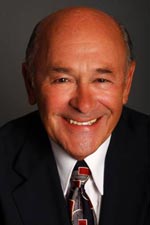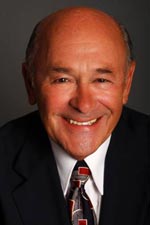Moses will part the Red Sea all over again this week when Promenade Pictures releases an all-new computer-animated version of The Ten Commandments to theaters across the country (see the trailer here). And if the film’s producers have their way, Moses will be blazing a trail not only for the Israelites, but for twelve movies in their planned Bible Epic Series, all animated films that will be released, on average, at a rate of one per year.

The series has the backing of at least one serious Hollywood veteran. Frank Yablans, the chairman and CEO of Promenade Pictures, was president of Paramount when it produced The Godfather, and after that, he was CEO of MGM/UA. Yablans and Cindy Bond, the president and COO of Promenade, spoke with CT Movies by phone.
Frank, on the Promenade website, you wrote about “the impersonal treatment of the independent producer by the giant, multi-national conglomerate. They produce and distribute whatever they believe can turn a profit without regard to social conscience.” Is that what motivated you to get this business up and running?
Frank Yablans: Absolutely. And having met Cindy Bond, who was in the family and faith-based business at that time, I just felt the kindred spirit and the other co-founders with us were all of the same mind and same feelings about what we want to produce. I started out with Disney in this business in 1950s.
What were you doing with Disney?
Yablans: I was in distribution in the Midwest. We had just formed Buena Vista, and we were so true to our calling. Walt was very, very insistent that we never stray outside of the family area that we wanted to satisfy, and consistently it was the best performing films that you could possibly get.
Then they lost their bearings a little bit.
Yablans: They lost their bearings because they got big again. Big always seems the path to downfall. It may be the path to profits, but it’s certainly the path to a moral decline.
Promenade gives you some opportunities that you never had before, I presume.
Yablans: Promenade is a labor of love. It’s a passion. Whereas the other things were passionate but they weren’t a labor of love.
Cindy, how do you come into this picture?
Cindy Bond: Frank and I met for lunch about a little over five years ago when I was with my own company, Providence Entertainment. Frank and I met because we were searching for a CEO for that company, and Frank and I hit it off immediately.
Now, five years later, we’ve never even had an argument. We get along great. We have a lot of laughs. We not only have a family company in terms of the type of product we make, but we actually live what we make. I mean, we are a family here in our company, with the dogs and kids and everybody running in and out of this place.
Yablans: It’s an extraordinary thing when people come to see us; we always have people coming in and out. They are absolutely in awe of the family atmosphere that we have in our offices. Everybody here is just tuned into their personal lives together and their business lives together and their families. It’s just an amazing operation.
Who initiated that lunch five years ago?
Bond: One of our partners, Ron Booth.
Yablans: The company that Cindy was with at that time should have been very successful, but unfortunately they seemed to have hired the wrong people in key positions. I went in as a consultant to analyze whether or not there was a viable business there. And although I thought there was a viable business, we couldn’t seem to raise any more money.

So that company went out of business, and because we all got along so well—Cindy Bond and Ron Booth and Charlie Gay and I, these are the four founding partners—we said, “Let’s just start our own company.” And for 4½ years, we’ve just stayed under the radar developing our screenplays, developing our material. I had an absolute firm rule: No publicity, because we have to let our product speak for itself. And before we got ready to roll out the Ten Commandments, nobody even knew Promenade existed except the creative community.
And let me tell you something: For 3½ years, not one of us took a dime in salary.
But are you getting a salary now?
Yablans: Yeah. We ultimately got funded, because we had something to sell.
Do you have one investor, or a bunch?
Yablans: Right now it’s one. But if you’d like to contribute, then we’d have two!
Bond: That’s one for the company, but we have numerous investors for pictures.
Yablans: We’ve already funded eleven more of the Epic Stories of the Bible. We have a $120 million war chest. And the second film, Noah’s Ark: The New Beginning, which I promise you will be hilariously funny for families—
Funny?
Yablans: Oh yeah, because we’re telling the story through the eyes of the animals. The animals will all speak. Humans won’t hear them. So we’ll have the animals talking, and of course they’re all married couples. So you’re going to have all the old married couple stuff going on. Like, we have two prairie dogs, and Mr. Prairie Dog is allergic to everything. He gets heartburn. Everything is just wrong. And Mrs. Prairie Dog says, “This is a cruise? You promised me a cruise. You call this a cruise?” So by humanizing these stories, we make it much more reasonable and accessible for children to embrace them, and we still stay completely true to the biblical text that we have to be able to tell the story with.
Would it be accurate to call Promenade a Christian film company?
Yablans: No.
Bond: No.
Why not?
Yablans: Because it’s not. It’s a family and faith-based film company. Because it’s faith-based, it’s going to do films that will be, let’s say, a Judeo-Christian ethic and morality. We will not make a film that does not have a moral core.
Any New Testament stories planned in the Bible epic series?
Bond: At this point, we’ve only named the first six and we’re under deep discussion for the next six. It’s very possible. We’re seriously contemplating that.
But the first six are all Old Testament stories?
Yablans: Yes.

Bond: At this point, we’ve got Noah’s Ark: The New Beginning, that we’re halfway through production on. David and Goliath we just started. Those are set in stone. The next three we could slip in a New Testament story, but we’ve pretty much decided to stay in the Old Testament.
Yablans: People can go to our website and suggest some good stories for us from the New Testament, because we’re open to that.
Are you nervous about the current state of things when it comes to faith-based films? The Passion of The Christ did well, which triggered some of this thinking in Hollywood, but The Nativity Story and Evan Almighty essentially bombed. And Fox Faith is struggling at the theater. What do those indicators say to you both?
Yablans: That they had bad management and no talent.
Steve Carell and Morgan Freeman are no talent?
Yablans: I’m not talking about the people that are in it. I’m talking about the screenplays. You know, acting talent cannot make a bad script good. Acting talent can make a good script great. Morgan Freeman is an extremely talented man. But if the material itself is not good, you’re in trouble.
Now, those are two movies on a big scale. I’m also thinking about films like Fox Faith films, $5 million movies, which are the types of movies you’re going to make?
Yablans: I don’t think they were spending five million dollars. I think they were spending two million dollars.
Bond: Two to three.
Yablans: And they weren’t supporting the films [with much marketing and publicity].
What was the budget for The Ten Commandments?
Bond: $11.6 million. We’re actually in the 5-to-20-million-dollar business. Fox Faith is in the 2-to-3-million-dollar business. There’s a big difference.
How did the idea for Epic Stories of the Bible come about?
Bond: The animated Ten Commandments movie idea was pitched to me about four years ago. I found a screenwriter, Ed Naha, about six months later. He wrote a first draft of the script, and it was really terrific. I originally pitched Ed to write that story because I had a high degree of confidence in the potential of the story, and I also had a high degree of certainty that I could arrange the financing for the picture.
After he gave me the script, we went on our journey to finance the picture. We also were on a journey to find an animation studio, because this was a tricky type of movie to animate for a price, with the plagues and thousands of people and so forth. Our travels brought us to New Zealand, through a pastor friend who’s an executive producer on the picture, a guy named Brad Cummings. Brad introduced us to Trevor [Yaxley, CEO of Huhu Studios, a co-producer on the film]. I started telling Trevor about the movie, and he felt called to get in the business with us on The Ten Commandments. Promenade had already arranged some of the production financing, but we then worked with Trevor to arrange the rest of the production financing.

While we were making Ten Commandments, we then had the idea to conceive of a series of films, based upon analyzing the marketplace. I had felt that there was a big gap in the marketplace, a big opportunity to put something out like this whereby we could create an opportunity to provide “foundation-type” stories. We went into a co-production deal on six pictures with Trevor and Huhu Studios, as well as with a company in Singapore called iVL Animation. And then Epic Stories turned into twelve pictures because another group of Christians in Singapore said they wanted to take the series to twelve, and that they would fund them, which is a real blessing.
So as Christian investors, I would think they would want some New Testament stories.
Bond: Yeah, we’re all talking about New Testament stories. We’re very open to that. The concept behind the series is I remember growing up watching the DeMille movies, the Ben-Hurs, the Robes, the original Ten Commandments, the Cleopatras. I missed seeing all those wonderful epic movies, and so my concept is to have this series be these epic stories.
We’re very seriously looking at Paul right now, and certainly looking at the story of Jesus. But there have been quite a few movies done on that, and we want to make sure when we do it, we’re going to have our style and put our sensibility to it.
Audiences have been spoiled by Pixar and DreamWorks. Is there any concern, at least visually, that these films might not measure up to those?
Bond: They’re working off of $100 million budgets. We’re at a little more than a tenth of that. But I think I read a quote from John Lasseter or someone else at Pixar that says story trumps visuals. That’s something we know to be true. If that weren’t the case, then a movie like Hoodwinked wouldn’t have been a success. Hoodwinked was a wonderful story, but it didn’t have Pixar animation. But it did well because they did a really good job in their storytelling.
I think people will be very surprised to see the amount of detail and the colors and the level of resolution in our animation. It’s pretty darn good.
What are your hopes for Ten Commandments?
Bond: The thing that drives me the most is that we are getting these stories out to the marketplace, because we really feel that we can use these stories, these movies, to get people interested for the first time in these stories of the Bible—or give them a deeper interest in the stories of the Bible, to get them back into the Bible. I mean, that’s what this is about, to give them a deeper knowledge and understanding of the Word of God. They have a real kingdom purpose here, as opposed to just something that we’re putting out for the money. That’s not what’s driving this.
Copyright © 2007 Christianity Today. Click for reprint information.












